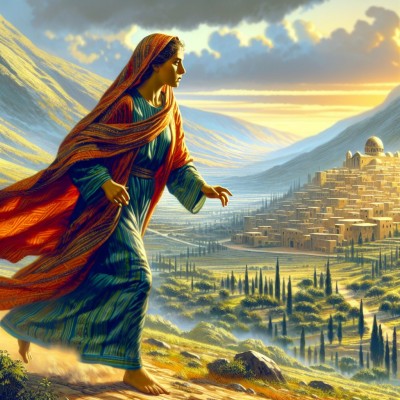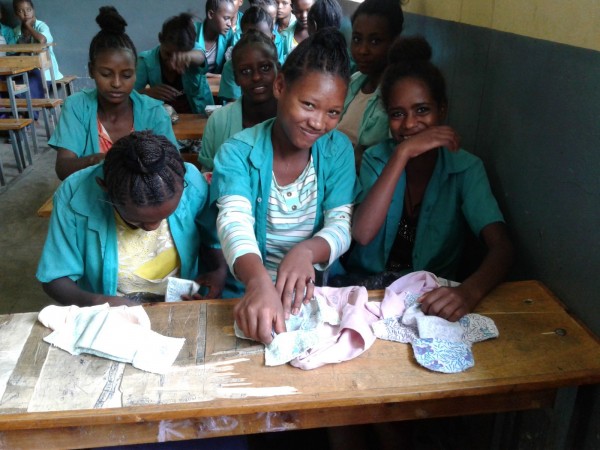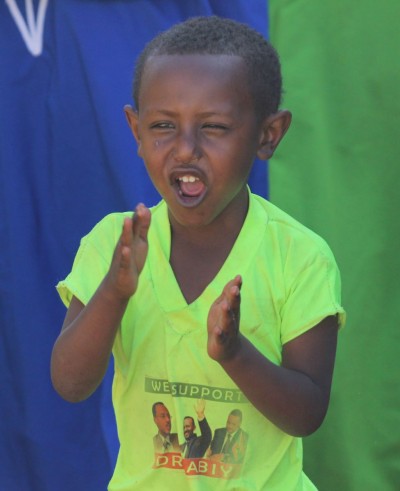
This short writing is a personal reflection on the person of Mary, looking in the gospel for an answer to the question: What was Mary like? What does the Gospel really tell me about Mary? Extracting from the gospels all the quotes that speak of Mary, I have learned a lot about her; I could even draw up a “profile” with her personal characteristics. But, just as it happened to Mary, as I will explain below, looking for the answer to this question, I have found something I was not looking for. I have realized that Mary is not a static, immutable character, but she evolves and changes as a mother and as a woman.
There is a key that connects the occasions in which Mary searches for her son every time she loses him. In this loss-search lies the change in Mary. Each time this happens (on three occasions), it’s a blow for Mary that makes her reflect, meditate, and change, in such a way that in the end she is able to find Jesus. Let's see.
Mary's first “lost - seek - find”
Lk 2:41-46: As a teenager, Jesus decides to stay in the Temple to listen to and talk with the doctors of the law, instead of returning to his parents. They were already on their way home and realize that they lost him, so they return to the temple. When they find him, Mary, like a good mother, rebukes Jesus who was already giving some clues.
She loses Jesus as a child, dependent on his parents, and finds him as an adolescent with an air of independence. She stops being a protective mother and becomes a mother who must exercise her authority (Lk 2:50-51b) so that the adolescent does not get lost again.
Mary's second “lost - seek - find”
Mk 3:31-32 (Mt 12:46-50; Lk 8:19-21): Mary and Jesus' brothers and sisters are looking for him and find him preaching to the crowd. And what do they find? A Jesus who loves them more for being his sheep than for being family. Once again, Mary was looking for her son, and she finds a shepherd. She goes from being a mother to being a disciple. She loses Jesus the son, and finds Jesus the teacher. From this moment on, the evangelists no longer refer to her as his mother.
Third “loss - search - find” of Mary
Jn 19,25-27: “Then Jesus, seeing his mother, and his beloved disciple standing next to her, said to his mother: “Woman, look at your son.” Then he said to the disciple: “Look at your mother.” Mary loses the shepherd and finds herself a seed of the Kingdom of God. Jesus charges both of them (the disciple and the woman) to continue the announcement of the Kingdom, welcoming each other. The fraternal love that has been created among Jesus' followers knows no kinship or blood. The Kingdom of God is built with the love that Jesus has given us, which is to care for and serve one another.
The angel Gabriel appears to Mary to tell her that she will conceive a son by the power of the Holy Spirit. On the cross, this angel is Jesus himself, who tells her that she must continue forward in building the Kingdom of God.
These three instances of Mary losing- searching- finding, reflect not only a process of Mary’s self-understanding and that of her son, but also a process that we may encounter in our own lives, a process of discovery and re-discovery about who we are, what our mission is, and how our relationships and our understanding of others keep changing our lives.

We all know that we live in a world defined by capitalism’s economic model, where almost all of our activity is focused on work, on how to obtain money to live. Our power to purchase goods marks our lifestyle, our customs and habits, our relationships and even the development of our capacities. And in this world, women have an added challenge.
We know what happens to us when we have our menstrual period: tiredness, pain, moodiness, susceptibility and, what is worse, bleeding. Despite this, with a pill to control the pain, perhaps another to control the changes of mood, and a good sanitary napkin, tampon, or other device, we can move on and continue with all our responsibilities. I am not going to focus on the extra expense that this entails. We are not born with these pills in our hands, nor are we born with pads. We must but them, and depending on which product, we even pay VAT! So, being a woman carries additional expense.
What I have just described is what we do in Spain or in any other developed country. But what about developing countries? What happens in Ethiopia? What happens to teenagers who study in the rural schools of Meki, where we work?
What happens to them is exactly what happens to us, with the difference that they have no resources for the "magic pills" or to buy sanitary napkins.
It is common to see girls who fall asleep in class, or who seem to be somewhere else, who do not play at recess or do not participate in any conversation. They have experienced menstruation for the first time, which for them is a taboo subject; suddenly they are no longer girls but women, because they can have children. Society looks at them differently, and they need time to integrate all these changes.
In addition to the reactions listed above, the most frequent result we see is that they skip class. Most teenage girls are absent from school about three days a month, due to their period. Why? Some reasons are cultural: shame, taboo, a sense of impurity. Others would be the same any woman in developed countries would have to face if they did not have a “women's kit”: they are not feeling well, and they do not have the means to control blood loss. Perhaps the days they miss class are precisely the days of the final exams. Or they missed the class on the topic that comes up in the exams. Or they simply lost the thread of the history of their country and now it is more difficult for them to follow the explanations from teacher.
In the “Classrooms for Equality” project, which we carry out in three rural schools in Meki, we talk to the students about respect for human rights, about those daily situations that arise, which are detrimental to these rights and in which women, unfortunately, are usually the most directly harmed.
In addition to these educational sessions, we want to address the problem of girls who miss school due to menstruation. It is not fair that a girl does not pass the exams because she has not been able to do them, or because her attendance at her class has been irregular and she has gaps in the knowledge learned. And this has an immediate solution.
The “Girl’s Clubs” are groups that are organized in the schools. It is an initiative that is carried out in several African countries and that has had a very good response. It consists in forming groups of teenage girls, with a teacher as a leader or person in charge, who meet biweekly and in which topics on women's health, adolescence, body changes such as menstruation, their taboos, and beliefs are debated. They also discuss their rights as women, the inherent equality they should enjoy in regard to their male classmates, and they can present their doubts and concerns. They also prepare short theatrical representations about situations of inequality that occur in their daily life, and which they exhibit, with great success, during the school festival, on the end of the academic year.
We wanted to support them with other complementary activities, such as group dynamics to reinforce their self-esteem, or with the preparation of sanitary napkins.
In rural areas a pack of pads, which are not always on sale, is very expensive and girls cannot afford them. Thus, normally women wear a rough piece of fabric or just avoid leaving their homes. What we propose to do for the girls in the teenage groups is a workshop in which they learn to make washable and reusable sanitary napkins. Making a pad of this type can cost the same as a conventional pack with the difference that the expense is made once or twice a year, depending on the use and care. In addition, we give them women’s underwear and a bar of soap to wash them. In the workshop we use a sanitary napkin already made as a model, and they follow the steps until they are completed. Obviously, not all of them have the same skill in sewing, but with practice they improve. We teach them how to use them and how to maintain proper feminine hygiene. In addition, and in coordination with the health education and first aid program that we also carry out in schools, we provide them, when they need it, with medications to relieve pain so that they can attend classes with a better disposition.
And thus they already have the “women's kit”, ready for school, ready for work, and ready to continue overcoming obstacles in the race for a dignified life, a life in which there may be equal opportunities for everyone.

In 1890 Italy annexed Eritrea as its colony (it was the first Italian colony in Africa), and remained in the region until 1941, when during the Second World War Italy lost its occupied territories to the Allied forces. Then Britain took over, and Eritrea was under British domination until 1952. After that, Eritrea became a federated state of Ethiopia, but Emperor Haile Salassie kept reducing Eritrean autonomy until the country became just another region of Ethiopia. As a reaction, in the early 60s different Eritrean groups began the fight for their independence.
The conflict (with all kinds of struggles, battles and thousands of displaced people) lasted until 1991, the year in which a referendum was held in Eritrea, whose result was, in 1993, the proclamation of its independence. However, the territorial boundaries between the two states remained to be clarified, and disagreements over border control resulted in a warlike conflict in 1998.
In 2000, Ethiopia managed to occupy a quarter of the disputed territories, which led to the surrender of the Eritrean army and the signing of a peace treaty in Algiers, mediated by the UN. This agreement established the sovereignty of the disputed territories. Ethiopia, although initially agreed with the treaty, was not willing to cede the Badme region, and consequently the conflicts continued in this area after the peace agreement.
The two countries remained isolated from each other, with borders closed and the impossibility of anyone moving between them. Families with members on both sides of the border had no way of visiting, and not even communicating with each other. The Ethiopian episcopal conference, which covers Ethiopia and Eritrea, had to meet in Rome!
This painful situation ended last year, 2018, at the initiative of the current Ethiopian President, Dr. Abiy Ahmed Ali, who decided to meet with his Eritrean counterpart to sign a document declaring the end of the state of war, and to make the Algiers peace agreement effective.
This achievement is the main reason why Abiy Ahmed Ali has been honored with the 2019 Nobel Peace Prize, which was announced on October 11. The prize was proudly received by millions of Ethiopians, who thus saw their president give a new voice to the world, a voice of a proud but also a peaceful people, who decidedly chose peace instead of war.
Much remains to be done, of course, but it is obvious to many that Dr. Abiy Ahmed Ali has opened doors, and more importantly, has awakened hope among Ethiopians that things can really change and that they can enjoy, in a future, perhaps not too distant, a more united world in which borders are open bridges and not walls of separation.


